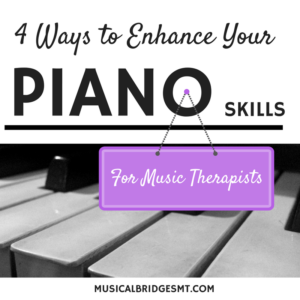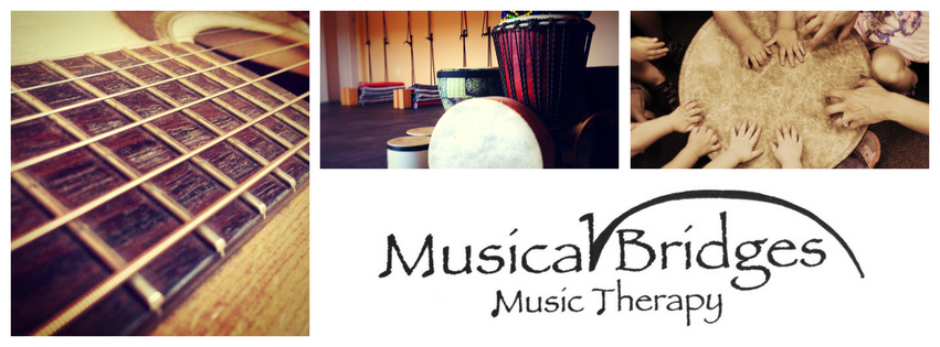 Hey there music therapists! Are you shying away from the piano? Afraid that it is just “too hard”? From my experience, I usually find that music therapists who don’t play the piano have had training on how to play the piano “classically” rather than “functionally”. This focus on traditional piano playing/learning has left many behind in the race to master using the piano in sessions because of the focus in learning to master classical performance of the instrument, rather than mastering functional performance. The trick is to focus on playing the piano “functionally”, as we do with the guitar. The guitar is most likely your accompaniment instrument, not your performance instrument. How many of us that use guitar in sessions sit down and read notated guitar music? I know I don’t! This is because I use it as a rhythmic accompaniment because my brain needs to be focused on events happening within the session, not intricate note playing and reading musical notation. This is what we need to be doing with piano in order to make it less intimidating and more functional to our purposes. Learn to strum your piano just like your guitar! You don’t need to be able to read notation to make it work in sessions. Just use the piano to accompany rather than perform and you will automatically see a difference in the ease of the instrument.
Hey there music therapists! Are you shying away from the piano? Afraid that it is just “too hard”? From my experience, I usually find that music therapists who don’t play the piano have had training on how to play the piano “classically” rather than “functionally”. This focus on traditional piano playing/learning has left many behind in the race to master using the piano in sessions because of the focus in learning to master classical performance of the instrument, rather than mastering functional performance. The trick is to focus on playing the piano “functionally”, as we do with the guitar. The guitar is most likely your accompaniment instrument, not your performance instrument. How many of us that use guitar in sessions sit down and read notated guitar music? I know I don’t! This is because I use it as a rhythmic accompaniment because my brain needs to be focused on events happening within the session, not intricate note playing and reading musical notation. This is what we need to be doing with piano in order to make it less intimidating and more functional to our purposes. Learn to strum your piano just like your guitar! You don’t need to be able to read notation to make it work in sessions. Just use the piano to accompany rather than perform and you will automatically see a difference in the ease of the instrument.
Though it does take times and practice, in an effort to help reduce fear of practicing the piano, I have compiled 4 tips to help you embrace your inner piano rock star.
Each time you sit down to practice ask yourself the following questions:
1. Is this Functional? Is the way you are playing functional for therapy? Can you effectively engage with the client while playing? Does the way you play create any distractions or barriers?
2. Is this Practical? Is what you are playing necessary to achieve the goal for your client? Is the style or way you are playing within your playing ability? Are you making it harder on yourself than it really needs to be?
3. Is this Motivating? If you aren’t motivated to practice or learn, you will not practice or learn. Start with music that interests you! Once you are confident playing songs that you enjoy, you will have built your skills up and you will be ready to add more of a variety that you might use with clients.
4. Do I Know the Chords?– start simple. You don’t need to be able to play in each key. Just start with the basics and build from there. I suggest practicing without looking at any notation and start with three chord songs. Play just as you play the guitar… with lead sheets. This will force you to memorize the fingerings and notes for the chords faster and will keep your brain focused on less so you learn faster.
—–
Try this approach and see if it helps! I wish you all the best of luck in your future piano endeavors and I hope you choose to brush up or improve your piano skills! I guarantee it will be well worth it!
